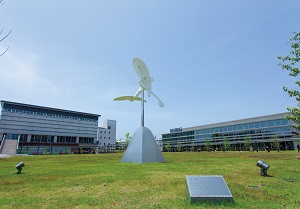本文
Doctoral Program Policies ~Graduate School of Nursing~
Admission Policy
The Doctoral Program conducts academic and research activities in nursing science, internationally and in an interdisciplinary manner, in order to develop the academic foundation of nursing science, explore its depths, and cultivate talented personnel with the advanced professional ability to conduct creative and independent research activities.
The Doctoral Program, therefore, seeks individuals with the following qualities.
・A rich humanity, a sense of ethics, and the ability to explore people's health and society
・An interest in challenges related to nursing, a profound knowledge in specialized fields of nursing studies, and flexible and creative thinking skills
・An interest in challenges related to nursing science and the ability to conduct research
activities to solve such challenges
・Aspirations to explore the universality of nursing science to become researchers and/or educators in higher education to contribute to the development of the discipline
・Aspirations to contribute to society through nursing research and nursing education from an international and interdisciplinary point of view
Selection Policy
The examination for admission to the Doctoral Program consists of a written portion (English language testing and essay writing), an oral portion, and submittal of a research plan, which are used to make a comprehensive evaluation of the following abilities.
English: Evaluate the candidate's ability to read and understand the content of text written in English and answer questions based on the text.
Essay: Evaluate the candidate's ability to contribute to development of the academic foundation of nursing science and research, (including his/her direction in nursing), logical thinking ability, abstract thinking ability, analytical ability, and originality.
Specialized area: Evaluate the candidate's expertise in nursing studies and abilities needed to conduct research activities.
Interview: Evaluate the candidate’s knowledge on the research subject his/her research plan, as well as its significance, purpose, methodology, and documentation.
Curriculum Policy
The Doctoral Program promotes scholarship and research on nursing in an international and interdisciplinary manner to enable students to form their academic foundation in nursing science, explore the depths of the discipline, and cultivate their professional ability to conduct research activities independently and creatively. In accordance with the program’s educational philosophy, the curriculum of this program has been organized as follows.
(Structure and content)
・The curriculum consists of three sets of courses: Common Studies, Specialized Studies, and Research Tutorial Seminars.
・The areas of study that constitute the curriculum are: Cancer Nursing, Adult Nursing, Child Health Nursing, Psychiatric Mental Health Nursing, Family Health Nursing, Community Health Nursing, Nursing Pathophysiology, and Nursing Management.
・The objective of Common Studies is to develop students' advanced scientific capabilities by solidifying his/her academic foundation in nursing.
・The objective of Specialized Studies is for students to accumulate, select, and expand new expert knowledge, and thereby refine their expertise in specific areas of nursing studies.
・Tutorials help students to explore research subjects and support the process of writing a doctoral dissertation in a step-by-step manner.
(Sequence)
・Students enroll in courses from Common Studies and Specialized Studies in accordance with their areas of specialization. The courses are organized such that they allow students to continue taking the Research Tutorial Seminar in Nursing for a period of three years.
・In the process for submitting a doctoral dissertation, students design a research plan in their first year, followed by an interim reporting session in their second year, then submission of a paper for the first review in their third year.
(Implementation)
・To enable students to acquire the abilities defined in the Diploma Policy, guidance on course registration is provided in accordance with the coursework model to support the process of coursework, guidance on writing a dissertation, and the dissertation defense.
・To increase students' research abilities, each student is assigned a main advisor and a secondary advisor who provide guidance on writing a doctoral dissertation under a multiple advisor system.
(Evaluation)
・Achievement goals, grading criteria, and methods aligned with the Doctoral Program Diploma Policy are made known to students. These include students' own self-evaluation, course evaluation, and assessment by faculty. Final assessment is made in accordance with the items stipulated in the Diploma Policy, which define the competence students need to attain.
・The main and secondary advisors conduct the research plan review, ethics review, interim report meeting, and dissertation defense, then the Academic Degree Examination Committee reviews the dissertation in accordance with the Doctoral Dissertation Examination Criteria.
Diploma Policy
The doctoral program aims to cultivate the advanced professional ability to promote scholarship and research on nursing in an international and interdisciplinary manner in order to develop the academic foundation of nursing, investigates its depths, and conduct research activities independently and creatively.
Candidates who satisfy the following completion criteria are awarded the degree of Doctor of Philosophy in Nursing.
・The ability to fulfill the responsibilities of an expert in nursing and pursue a universal philosophy of nursing which provides a foundation for the development of nursing science
・The ability to conduct research and development of global-standard knowledge and technology in nursing, and bring forth innovation in nursing, to further advance the academic foundation of nursing science
・The ability to use cutting-edge knowledge and technology related to nursing, as well as insight in related fields, on an ethical and cultural foundation, to help people achieve secure lives and improve their quality of life by engaging themselves in efforts to develop forms of care that will contribute to people and society
・The ability to conduct research activities aimed at advancing the discipline of nursing, gain new insights, and present the findings to the world
・The ability to collaborate with professionals in Japan and overseas, participate in policy development and decision-making, and build and reform health care and welfare systems
・The ability to engage as educators in higher education in producing advanced practical nurses for the next generation who, on a scientific and interdisciplinary foundation, strive to build people's healthy lives and health culture









